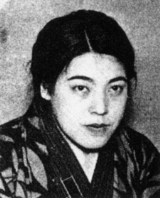
Fumiko Kaneko
Encyclopedia
was a Japanese
anarchist and nihilist
who was arrested and convicted for conspiring against the Showa Emperor of Japan by supporting Korean independence
. She died in prison.
and recognition in society. Still, Kaneko was able to attend classes thanks to the pleas of her mother.
After Kaneko's mother failed to sell her daughter to a brothel, Kaneko was sent to her paternal grandmother's in Korea when she turned nine. A wealthy woman, Kaneko's grandmother registered Fumiko Kaneko as her own daughter and promised her a proper education. Kaneko was an intelligent child interested in pursuing an education comparable--both in depth and breadth--to that of her male classmates. But Kaneko's grandmother disapproved of her granddaughter's attitude and promptly began abusing
her.
Kaneko's maternal family learned of this mistreatment and sent her back to Japan.
Japanese people
The are an ethnic group originating in the Japanese archipelago and are the predominant ethnic group of Japan. Worldwide, approximately 130 million people are of Japanese descent; of these, approximately 127 million are residents of Japan. People of Japanese ancestry who live in other countries...
anarchist and nihilist
Nihilist movement
The Nihilist movement was a Russian movement in the 1860s which rejected all authorities. It is derived from the Latin word "nihil", which means "nothing"...
who was arrested and convicted for conspiring against the Showa Emperor of Japan by supporting Korean independence
Korean independence movement
The Korean independence movement grew out of the Japanese colonial rule of the Korean peninsula from 1910 to 1945. After the Japanese surrendered, Korea became independent; that day is now an annual holiday called Gwangbokjeol in South Korea, and Chogukhaebangŭi nal in North Korea.-Background:In...
. She died in prison.
Early life
Kaneko was born to a former policeman and a laborer, and spent the first nine years of her life as an unregistered child. This status impeded Kaneko from receiving formal educationEducation
Education in its broadest, general sense is the means through which the aims and habits of a group of people lives on from one generation to the next. Generally, it occurs through any experience that has a formative effect on the way one thinks, feels, or acts...
and recognition in society. Still, Kaneko was able to attend classes thanks to the pleas of her mother.
After Kaneko's mother failed to sell her daughter to a brothel, Kaneko was sent to her paternal grandmother's in Korea when she turned nine. A wealthy woman, Kaneko's grandmother registered Fumiko Kaneko as her own daughter and promised her a proper education. Kaneko was an intelligent child interested in pursuing an education comparable--both in depth and breadth--to that of her male classmates. But Kaneko's grandmother disapproved of her granddaughter's attitude and promptly began abusing
Child abuse
Child abuse is the physical, sexual, emotional mistreatment, or neglect of a child. In the United States, the Centers for Disease Control and Prevention and the Department of Children And Families define child maltreatment as any act or series of acts of commission or omission by a parent or...
her.
Kaneko's maternal family learned of this mistreatment and sent her back to Japan.

